Herbs are far more than mere plants in Wiccan practice; they are central tools, imbued with unique characteristics and magical properties that make them indispensable in spells, rituals, and healing. This deep connection stems from Wicca’s identity as an Earth-centered religion, revering the life-giving and sustaining powers of Nature. Understanding the role of herbs in Wicca involves appreciating their elemental associations, their diverse applications, and the ethical framework that guides their use.
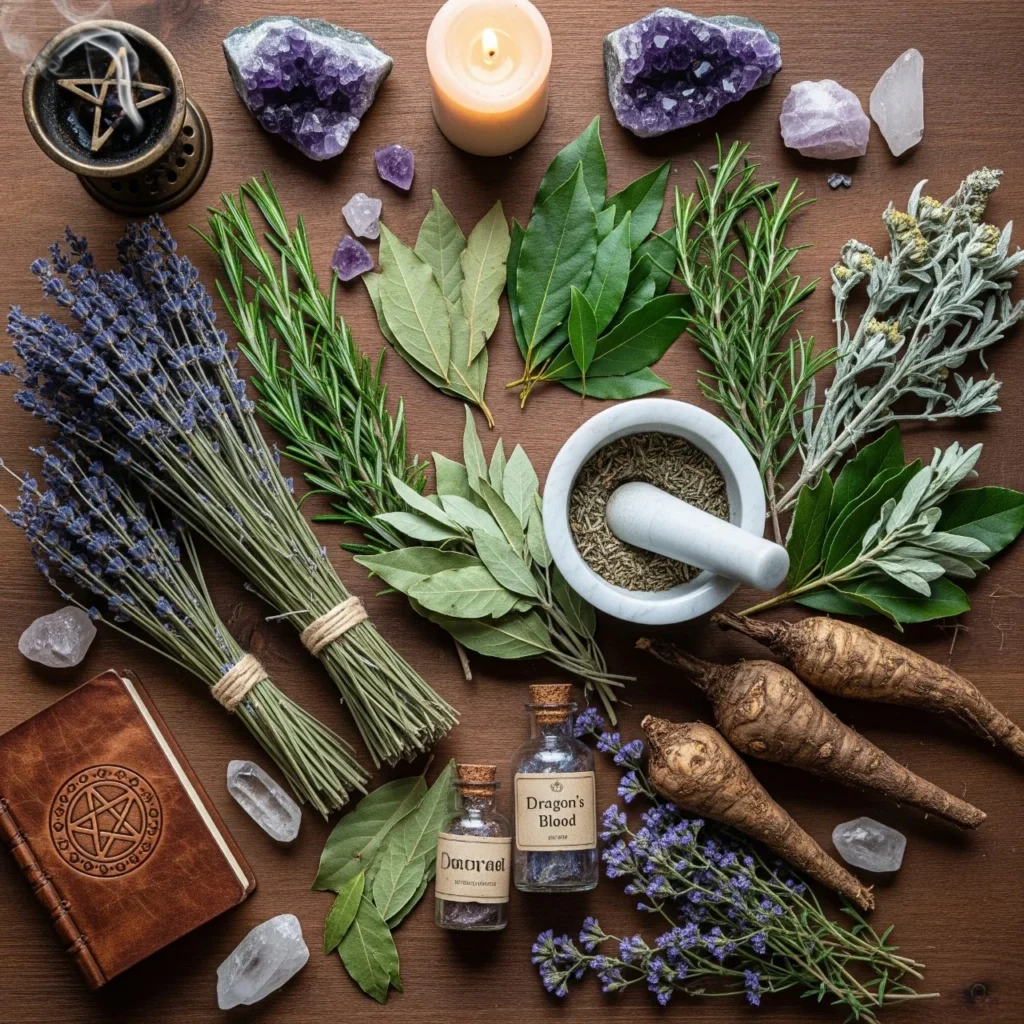
The Foundational Role of Herbs in Wiccan Practice
In Wicca, herbs are considered essential components alongside other ritual items like candles and crystals. Their significance is rooted in the reverence for the natural world, as they are seen as direct manifestations of the Earth’s profound connection to spiritual energy.
A fundamental concept in Wiccan herbal magic is the association of herbs with specific elements: Earth, Air, Fire, and Water. This elemental alignment provides practitioners with a framework for selecting and combining herbs to enhance the efficacy of their magical workings. For instance, herbs associated with Fire might be used for passion or protection, while those linked to Water could be for healing or love.
Crucially, all herbal applications within Wiccan magic are governed by the core ethical guideline known as the “Harm None” Rede: “An it harm none, do what ye will”. This principle dictates that all magical work, including the use of herbs, must be performed solely for positive purposes and must cause no harm, whether intentional or unintentional. This ethical framework profoundly influences the responsible and benevolent application of herbs within the Craft.
A Grimoire of Power: Key Herbs and Their Magical Properties
Wiccan herbs are often categorized by their primary magical intentions, making it easier for practitioners to select the right plant for their specific needs. Below is a guide to some key herbs and their properties, along with important safety considerations.
Herbs for Protection & Banishing
These herbs are used to create spiritual shields, cleanse spaces, and ward off negative energies.
- Rosemary: Often burned to cleanse a home of negative energy or hung on a front door for protection. It can also substitute for frankincense in some spellwork.
- Bay Leaf: Offers protection, purification, and strength.
- Garlic: Utilized for protection, exorcism, and promoting inner strength.
- Hyssop: Provides magical protection and purification.
- Mugwort: Employed to prevent astral or psychic attacks.
Herbs for Love & Relationships
These herbs are associated with attracting love, fostering fidelity, and strengthening bonds.
- Lavender: Used to attract love, promote peace, and foster fidelity.
- Basil: Associated with love, fidelity, and exorcism.
- Rose: A classic for love, beauty, and harmony.
- Cinnamon: Linked to love, passion, and fidelity.
Herbs for Prosperity & Success
These herbs are believed to attract money, luck, and aid in business endeavors.
- Chamomile: Known to attract money, luck, and business success.
- Basil: Also draws money and aids business success.
- Allspice: Effective for drawing money and business success.
- Pennyroyal: Helps to draw customers and foster prosperity.
Herbs for Healing & Wellness
These herbs are used for physical and emotional well-being.
- Comfrey: Used for general healing and as a poultice for minor cuts.
- Eucalyptus: Helps clear sinuses and upper respiratory issues.
- Lavender: Can alleviate anxiety and headaches, and soothe skin.
Herbs for Psychic & Divinatory Work
These herbs are associated with enhancing intuition, dreams, and foresight.
- Mugwort: Associated with psychic visions, dreams, and astral travel.
- Bay Leaf: Used for divination and to increase psychic powers.
- Eyebright: Enhances mental power, psychic ability, and inner vision.
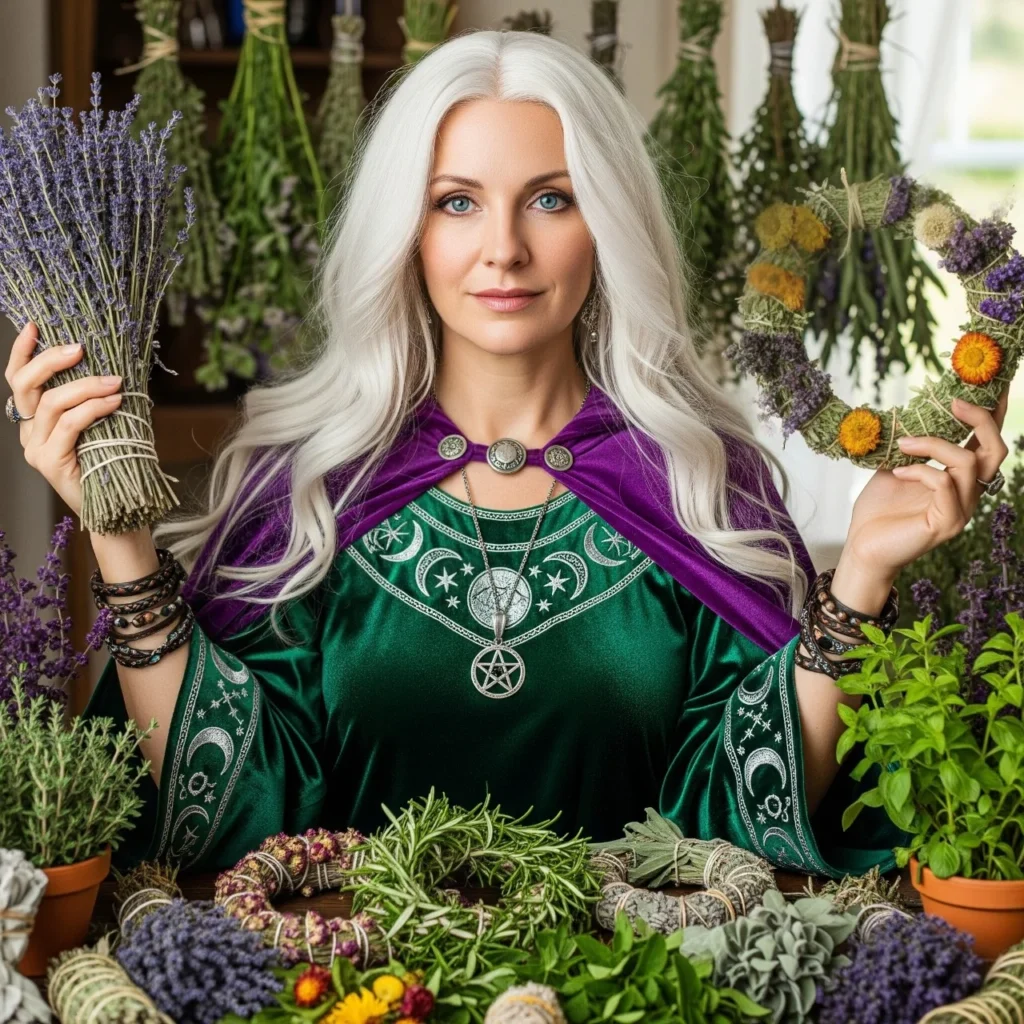
Important Safety Warning: Toxic Herbs
It is paramount to understand that not all herbs are safe for ingestion, and their use in magical practice does not automatically imply medicinal safety or suitability for internal consumption. Many historically used plants are highly toxic and can cause severe harm or death if ingested or improperly handled. Always consult a qualified physician or healthcare professional before using any herb internally, especially if you have existing medical conditions, are pregnant, nursing, or taking other medications.
Highly Toxic Herbs (Avoid Ingestion/Direct Contact):
- Belladonna (Deadly Nightshade): Highly toxic.
- Henbane: Highly toxic.
- Hemlock: Highly toxic.
- Wolfsbane (Aconite): Highly toxic.
- Mandrake: Highly toxic.
For quick reference, here is a summary of key Wiccan herbs and their primary magical properties:
Table 1: Key Wiccan Herbs & Their Primary Magical Properties
| Herb Name | Primary Magical Intention(s) | Associated Element | Common Applications |
| Lavender | Peace, Love, Sleep, Purification | Air, Water | Sachets for sleep, teas for calm, love charms |
| Rosemary | Protection, Healing, Clarity, Memory | Fire | Burn for cleansing, hang for protection, healing poppets |
| Mugwort | Psychic Visions, Dreams, Divination | Earth, Air | Ritual baths for dreams, protection oil |
| Sage | Cleansing, Protection, Purification | Air | Smudging for negative energy removal |
| Basil | Love, Prosperity, Protection | Fire | Sprinkle for money, love spells, business courage |
| Bay Leaf | Protection, Success, Divination | Fire | Carry for luck, burn for wishes, psychic enhancement |
| Mint | Prosperity, Healing, Mental Stimulation | Air | Money spells, healing rituals, mental clarity |
| Thyme | Courage, Purification, Protection | Air | Carry for strength, cleansing baths |
| Chamomile | Peace, Sleep, Love, Luck, Money | Water | Teas for relaxation, money drawing, gambling luck |
| Dandelion | Wishes, Divination, Spirit Communication | Air | Wishes, calling spirits, healing rituals |
Export to Sheets
It’s worth noting that some herbs, like Rosemary, are considered “universal” and can often be substituted for others in spellwork, offering flexibility to practitioners.

Cultivating Your Craft: Growing and Sourcing Wiccan Herbs
For those interested in a hands-on approach, cultivating your own herbs can deepen your connection to the Craft. Here are growing guides for some popular Wiccan herbs:
- Sage (Salvia officinalis): Prefers well-draining, slightly sandy or loamy soil and full sun (at least six hours daily). Water infrequently to prevent root rot. Seeds germinate in 10-21 days and don’t require cold stratification.
- Mugwort (Artemisia vulgaris): Grows easily in average, well-drained soil, is drought-tolerant once established, and thrives in full sun or partial shade. Seeds take 10-21 days to germinate, benefiting from 30 days of cold stratification, and need light to germinate.
- Lavender (Lavandula spp.): Can be challenging from seed, preferring well-draining, slightly alkaline soil (pH 6.5-8.0), full sun, and dry conditions. Seeds germinate in 14-28 days and benefit from 30 days of cold stratification.
- Rosemary (Rosmarinus officinalis): Thrives in well-draining, sandy soil, full sun, and dry conditions. It’s slow to germinate (14-28 days); soaking seeds overnight may help, and they require light to germinate.
- Basil (Ocimum basilicum): Relatively easy to grow, preferring rich, well-draining soil, full sun, and consistent moisture. Seeds germinate quickly, usually in 5-10 days, without needing cold stratification.
- Bay Leaf (Laurus nobilis): Best acquired as a potted plant due to slow growth from seed. Prefers well-drained, loamy soil and full sun to partial shade, with moderate watering. May need to be brought indoors in colder climates.
- Mint (Mentha spp.): Prefers rich, moist, well-draining soil, growing in full sun to part shade. Highly invasive if planted directly in the ground, so container planting is advised. Seeds germinate in 10-16 days.
- Thyme (Thymus vulgaris): Prefers sandy, well-drained soil and thrives in full sun, being drought-tolerant with minimal watering. Tiny seeds take 14-28 days to germinate and need light to germinate.
- Chamomile (Matricaria chamomilla): Grows well in light, well-draining soil and prefers full sun to partial shade, requiring evenly moist but not soggy conditions. Seeds germinate within 7-14 days and need light to germinate.
- Dandelion (Taraxacum officinale): Incredibly hardy, thriving in almost any soil type in full sun. Seeds germinate in 7-21 days. When foraging dandelions, always harvest from areas free of pesticides and away from roadways to avoid contamination.
Beyond cultivation, responsible sourcing and ethical considerations are paramount. When purchasing herbs, it is important to choose reputable suppliers for dried herbs or live plants. Sustainability in harvesting practices and respecting the plant kingdom align with the core Wiccan values of nature reverence.
Historical Roots & Cultural Significance: Beyond the Modern Practice
To fully appreciate herbs in Wicca, it’s important to understand the historical context. Wicca is a modern, Earth-centered religion that publicly emerged in England in the 1950s, largely influenced by Gerald Gardner. While Wicca draws inspiration from ancient pagan and shamanic practices, it is a contemporary revival rather than a direct, unbroken lineage from ancient times.
Herbs were central to pre-Christian European religions, used both medicinally and ritually by diverse groups, including Celtic Druids and local “wise women,” who were often midwives and healers. These historical practices involved burning herbs in bonfires, simmering them in cauldrons, and incorporating them into religious ceremonies held outdoors. This deep historical folk knowledge, particularly concerning healing and spiritual connection through plants, serves as a significant inspiration for modern Wiccan herbalism. The academic field of
ethnobotany provides a scientific and anthropological framework for understanding this long-standing human-plant relationship, studying how people and cultures interact with plants, including their chemical, nutritious, and poisonous properties, and their medicinal and cultural uses.
It is equally important to debunk myths and address common misconceptions. The “Witch-Cult Hypothesis,” popularized by Margaret Murray, which suggested that persecuted witches were followers of a surviving pagan religion, has been largely discredited by modern historical research. While some historical “wise women” were indeed herbal healers, academic research suggests that the idea that most accused witches were herbalists is contested, though plants were certainly mentioned in witch trial testimonies. This nuance is crucial for historical accuracy.
A particularly sensitive area involves “flying ointments.” Historically, these topical applications contained highly toxic plants, such as Belladonna, Henbane, Wolfsbane, Hemlock, Mandrake, and Aconite, used to induce hallucinogenic effects and sensations of astral travel. It is paramount to explicitly state the extreme toxicity and danger of these plants and to emphasize that such practices are not safe for modern replication. This approach demonstrates both historical accuracy and a commitment to user safety.
Safety and Ethical Considerations in Herbal Wicca
As reiterated throughout this guide, safety and ethical considerations are paramount when working with herbs in Wicca.
It must be emphasized that not all herbs are safe for ingestion, and their use in magical practice does not automatically imply medicinal safety or suitability for internal consumption. A clear, bolded list of highly toxic herbs mentioned in the provided materials should be included, explicitly warning against internal use and direct skin contact for some. This list includes, but is not limited to, Belladonna, Henbane, Hemlock, Wolfsbane, Aconite, and Mandrake.
Readers must be strongly advised to consult a qualified physician or healthcare professional before using any herb internally, especially if they have existing medical conditions, are pregnant, nursing, or taking other medications.
Ethical sourcing and practice are equally vital. The content should emphasize respect for nature and the environment through sustainable harvesting and foraging practices , for example, by taking only what is needed and leaving enough for the plant to thrive. Furthermore, adherence to the Wiccan Rede, “An it harm none, do what ye will” , must be reinforced. This ethical guideline extends to the responsible and conscious use of all natural resources, including herbs.
Herbalism in Wicca
Herbalism has played a significant role in Wiccan practices throughout history. The use of herbs in magical rituals and spells has been intertwined with Wiccan beliefs and traditions for centuries. Ancient cultures, such as the Celts and the Egyptians, recognized the power of plants and their ability to enhance spiritual experiences.
In Wicca, herbs are not just seen as physical substances but also as carriers of sacred energies and elemental properties. Each herb is believed to possess distinct magical qualities that can be harnessed for spiritual purposes. These qualities are often associated with the four elements of earth, air, fire, and water, as well as different planetary alignments. By understanding the energetic properties of these herbs, Wiccans are able to strengthen their connection to the natural world and channel specific energies for various rituals and spells.
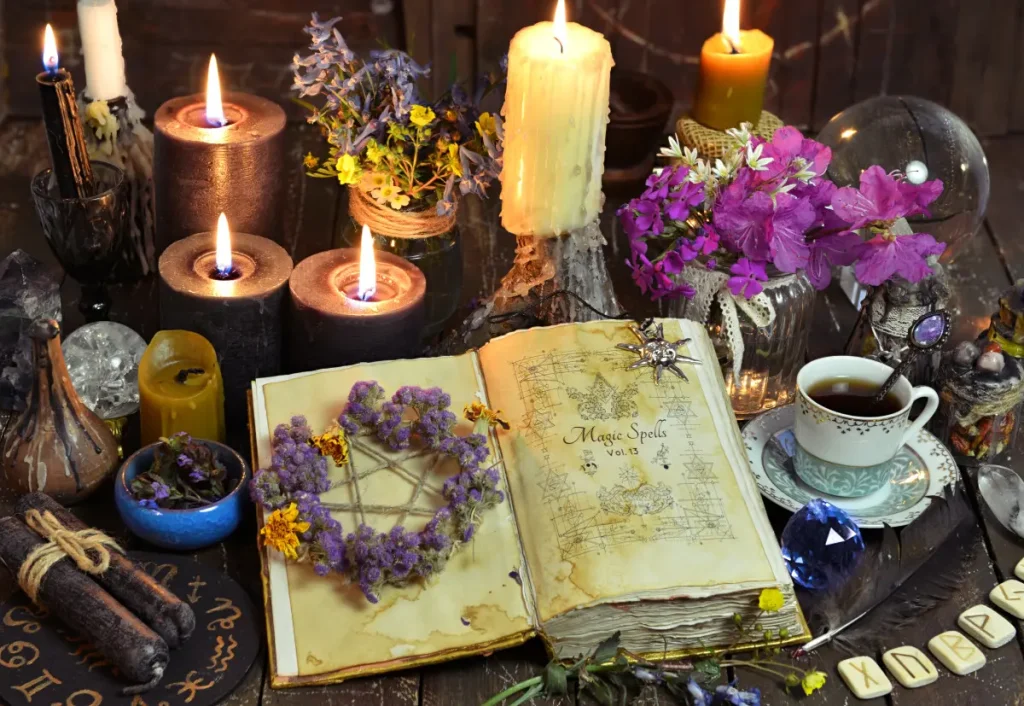
Spiritual Significance of Herbs in Wiccan Practices
Herbs hold a significant place in Wiccan practices, deeply integrated into the spiritual and magical aspects of this pagan belief system. Each herb possesses its own unique energetic properties, which are believed to align with various intentions and correspondences. Wiccans believe that by harnessing these energetic qualities, they can enhance their rituals, spells, and overall spiritual connection.
In Wicca, herbs are considered sacred allies that assist practitioners in their spiritual journey. They are used for purification, protection, healing, divination, and manifestation, among other purposes. For instance, lavender is often associated with peace, harmony, and love, making it a popular herb for spiritual baths and calming rituals. Similarly, rosemary is believed to enhance memory, spiritual clarity, and purification and is often employed in rituals to cleanse and consecrate spaces. By understanding the spiritual significance and energetic properties of herbs, Wiccans can infuse their practices with intention and tap into the natural magic that surrounds them.
The Role of Herbal Magick in Wiccan Rituals and Spells
Herbal magick and witch herbs play a pivotal role in Wiccan rituals and spells, harnessing the transformative power of plants to enhance spiritual practices. Wiccans believe that herbs possess energetic properties that can be aligned with specific intentions, making them valuable tools in spellcasting and ritual work. Each herb is thought to possess its own unique energy and correspondences, allowing practitioners to select the appropriate plants for their desired outcomes.
One common way to incorporate herbal magick in Wiccan rituals is through the creation of sachets or charms. These small bags are filled with a combination of herbs chosen for their specific properties and intentions. The sachets can then be carried on one’s person or placed in a sacred space to amplify and manifest the desired energy. Additionally, herbs can be used in the creation of oils, incense, and teas, further infusing their magickal properties into the ritual or spell. The careful selection and preparation of herbs in Wiccan practices are believed to enhance the practitioner’s connection to the natural world and the spiritual energies they seek to channel.
Incorporating Herbal Correspondences in Wiccan Sabbats and Esbats
In Wiccan traditions, incorporating herbal correspondences into Sabbats and Esbats is a common practice. These correspondences serve as a way to enhance the ritual and connect with the energies associated with specific times and occasions. For instance, during the festival of Samhain, herbs like sage and mugwort are often used for their protective and divinatory properties. These herbs are believed to ward off negative energies and facilitate communication with the spirit world. Similarly, in the celebration of Beltane, herbs such as rosemary and lavender are employed for their sensual and uplifting characteristics. These aromatic herbs are said to invoke love, passion, and joy, which align with the spirit of this spring festival.
Herbal Remedies and Healing Practices in Wicca
Herbal remedies and healing practices have been an integral part of Wicca for centuries. Wiccans believe that plants possess powerful energies and properties that can be harnessed for both physical and spiritual healing. From minor ailments to more serious conditions, herbs are used for a variety of purposes in Wiccan healing.
One of the most commonly used herbs in Wiccan healing practices is lavender. Lavender is known for its calming and soothing properties, making it ideal for relaxation and stress relief. It is often used in aromatherapy and bath rituals to promote a sense of tranquility and balance. Another popular herb is chamomile, which is renowned for its anti-inflammatory and sedative properties. It is often used to treat digestive issues and promote restful sleep. Wiccans believe in the power of intention and often incorporate rituals and spells into their herbal healing practices, focusing their energy and intent into the herbs to maximize their healing properties.

Creating Your Own Wiccan Herbal Apothecary
When it comes to creating your own Wiccan herbal apothecary, it is essential to start by selecting a variety of herbs that resonate with your magical intentions and personal preferences. Consider incorporating herbs such as lavender, rosemary, sage, and chamomile, which are commonly used in Wiccan practices, for their spiritual and energetic properties. Research the different symbolism and correspondences of these herbs to align them with your intended rituals or spellwork.
Once you have chosen your herbs, it is important to gather them in a respectful and sustainable manner. If you have the opportunity, cultivating your own herb garden can be a fulfilling and rewarding experience. However, if that is not feasible, you can source your herbs from local organic suppliers or wild harvest them following ethical guidelines. Remember to always thank the plants and honor their energy and life force as you collect them. By creating your own Wiccan herbal apothecary, you will not only have the tools you need for your magical practice, but also a deeper connection to the natural world and its healing energies.
Ethical Harvesting and Sustainable Practices in Wiccan Herbology
Ethical harvesting and sustainable practices are core principles in Wiccan herbology, ensuring a respectful and balanced relationship with nature. Wiccans believe in the interconnectedness of all beings, recognizing the importance of preserving the Earth’s resources for future generations. When it comes to harvesting herbs for magical or medicinal purposes, Wiccans prioritize mindfulness and responsibility.
First and foremost, Wiccans emphasize the need to obtain herbs from ethical sources. Wildcrafting, the practice of harvesting plants from their natural habitats, is approached with caution and reverence. Wiccans understand that overharvesting can disrupt the delicate ecosystems that support these plants and impact other species that depend on them. As an alternative, cultivating gardens with a variety of herbs is encouraged, allowing for a sustainable and controlled approach to sourcing. By growing their own plants, Wiccans have the power to nurture and protect these precious botanicals, ensuring their availability for years to come.
Conclusion
Herbs are a vibrant and integral part of Wiccan practice, offering a tangible connection to nature and a powerful means for magical and spiritual work. By understanding their diverse properties, learning responsible cultivation techniques, and respecting their historical context and inherent dangers, practitioners can safely and effectively incorporate these potent allies into their Craft. This comprehensive approach ensures a deeper, more meaningful, and ultimately safer journey into the world of Wiccan herbalism.

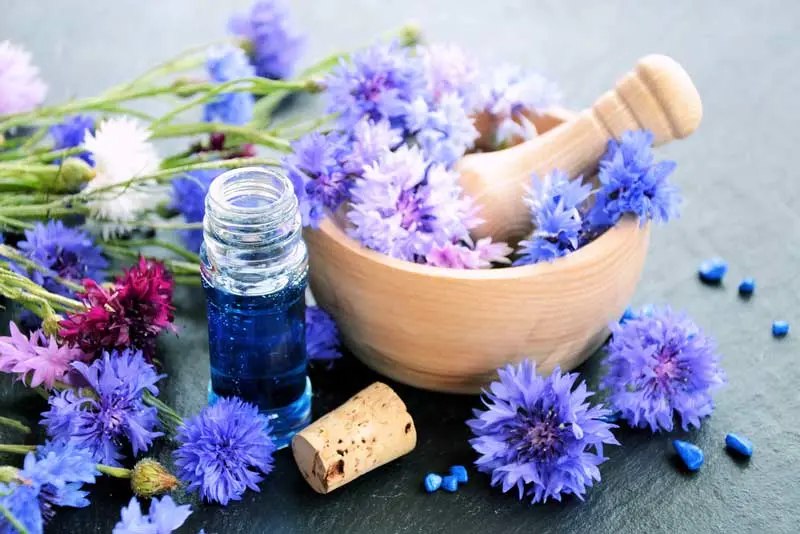


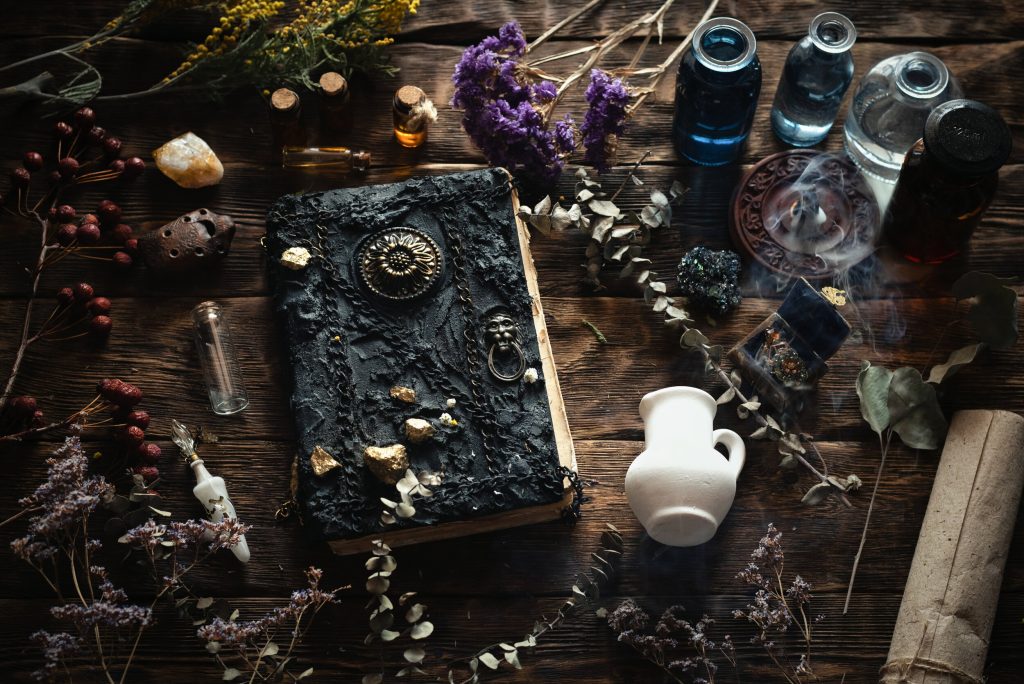

Heya! I’m at work surfing around your blog from my new iphone 4!
Just wanted to say I love reading your blog and look forward to all your posts!
Carry on the superb work!
What you wrote was actually very reasonable. However, think about this, suppose you were to write a killer headline?
I mean, I don’t wish to tell you how to run your blog, however what if you
added something that makes people want more? I mean The Role
of Herbs in Wiccan Traditions – Witch symbols is kinda boring.
You should peek at Yahoo’s home page and see how they write news headlines to get viewers to open the links.
You might try adding a video or a pic or two to get readers interested about what you’ve written. Just my
opinion, it might bring your posts a little bit more interesting.